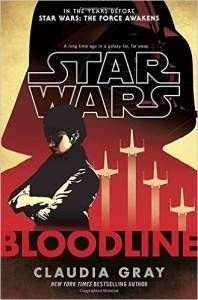
No Judgment Zone: Tie-In Edition
“Read anything interesting lately?” my friend Aaron asks me over pizza. We’re in his office, which has windows and an amazing view of the city below us. I’m super jealous of his windows.

“I used to be kind of snobbish about tie-ins. But we’ve gotten a bunch of tie-ins to the Pathfinder role-playing game for Battle of the Books, and they’ve done pretty well. There are some really good writers working in that universe.”
It’s a relief to be in the tie-in no judgment zone, and I agree that there’s some pretty good stuff out there in quite a few media universes. My knee-jerk defensiveness is silly, and I know it.
I have a long history with tie-in novels that begins with Dragonlance and Star Wars and has come mostly full circle, though as of yet I still haven’t felt the urge to revisit Margaret Weis and Tracy Hickman’s work. But the tie-ins I most distinctly remember reading as a teen were Timothy Zahn’s Thrawn trilogy (Heir to the Empire, Dark Force Rising, and The Last Command.) I regularly reread them for several years until my older brother moved out on his own and took all the Star Wars novels with him. Revisiting those books this year for a podcast was like coming home. And now there’s news that Zahn is writing a new Thrawn novel. To say I’m uncontrollably excited would be an understatement. I love those books.
Basically me.
It’s not like tie-in novels are reserved for the dregs of the writing world. Just looking at the newest Star Wars, we’ve got books by Claudia Grey and Chuck Wendig, neither of whom are lightweights. I know plenty of writers, myself included, who would sacrifice a goat for the chance to write fiction in their favorite media property. (Bungie, if you’re reading this, it’d be two goats and a llama if I could just write that The Killer Angels-style novel about Twilight Gap. Call me.) It’s almost like writers are giant nerds or something. I know, right?
So why that inner cringe when I cop to reading a tie-in novel? Are tie-ins really qualitatively worse than regular books? There are no doubt some stinkers out there. Trust me, I’ve read The Crystal Star. (In fact, I’ve read a significant portion of things that regularly populate “worst of the EU” lists, and I can’t help but wonder if my big brother was trying to find the bad ones.) But I’m beginning to think this might be an effect of sampling bias. Stick with me here.
When we’re fans of a particular universe and start reading the tie-ins, if you’re anything like me, you devour everything in your path. That means you get the really well-written books, but you also indiscriminately get the stinkers. And at least when I was growing up, the tie-ins weren’t getting reviewed at nearly the same rate as regular novels. Anyway, I’d wager that if you sat down and started plowing your way through the science fiction section with the same omnivorous energy, you’d find a similar proportion of utterly terrible books.
I think poo-pooing the literary quality of tie-in fiction is more a rationalization of the inner cringe rather than the actual reason for it. Sure, there are snobs, but there are also snobs who would be just as judgmental about reading dirty genre fiction.
I read tie-ins because I am a fan of a universe—a big enough fan that I want more than what’s on the screen or in the games. And there is still a juvenile terror that comes with unironically liking things, something that got implanted in a lot of us during our school years and will never be quite excised. Admitting that you’re reading Star Trek novels is the same as nakedly admitting you’re a fan far beyond someone who watches the show on time during its first run.
It’s okay to like things and be a fan. Neither you nor I have to defend our reading choices to anyone. If someone wants to turn up their nose at a fun political thriller just because it involves Princess Leia, it’s their loss. It’s not going to be mine.











